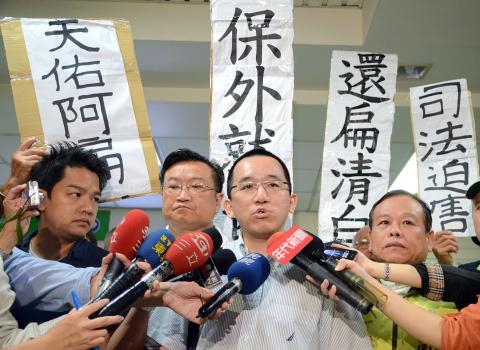The family of jailed former president Chen Shui-bian (陳水扁) yesterday urged authorities to pay more attention to Chen’s health problems, in light of the fact that he has previously suffered a stroke.
Chen Chih-chung (陳致中), son of the former president, said a team of neurosurgeons and urologists from major medical centers should be allowed to examine his father.
“I’ve been told by doctors that people who have had a thrombotic stroke have a high chance of relapse within two to three years,” he said during a visit to Taoyuan General Hospital to see his father.

Photo: Li Jung-ping, Taipei Times
Chen Shui-bian, who is serving a 17-and-a-half-year sentence for corruption, was sent to Taoyuan General Hospital on Wednesday night after complaining of pain when urinating and was admitted for extensive examination.
A group of Democratic Progressive Party lawmakers and medical experts on Friday said that a magnetic resonance imaging (MRI) test earlier that day had found that the former president has a 4mm-by-4mm trace of a cerebral vascular trauma in his right frontal lobe.
The Ministry of Justice said in a statement released later that day that the MRI showed he has a 4mm clot in his right frontal lobe that was caused by brain ischemia — a type of stroke caused by insufficient blood flow to the brain — but it is unclear when the stroke occurred.
The hospital determined that the condition was unrelated to Chen Shui-bian’s headache and speech problems, the statement said, adding that his condition does not qualify him for medical parole.
Despite the ministry’s explanations, Chen’s family and supporters continued their calls for him to be released for medical reasons.
Chen Shui-bian underwent a urine test in the hospital yesterday morning and his son said that while doctors are still investigating the cause of his father’s urination problems, the more serious problem is the clot that was discovered.
Chen Shun-sheng (陳順勝), honorary vice president of Kaohsiung Chang Guan Memorial Hospital, called in to a TV political talk show on Friday night and said that considering Chen Shui-bian’s condition, the probability that he would suffer another stroke was high.

Taiwan is to commence mass production of the Tien Kung (天弓, “Sky Bow”) III, IV and V missiles by the second quarter of this year if the legislature approves the government’s NT$1.25 trillion (US$39.78 billion) special defense budget, an official said yesterday. Commenting on condition of anonymity, a defense official with knowledge of the matter said that the advanced systems are expected to provide crucial capabilities against ballistic and cruise missiles for the proposed “T-Dome,” an advanced, multi-layered air defense network. The Tien Kung III is an air defense missile with a maximum interception altitude of 35km. The Tien Kung IV and V

The disruption of 941 flights in and out of Taiwan due to China’s large-scale military exercises was no accident, but rather the result of a “quasi-blockade” used to simulate creating the air and sea routes needed for an amphibious landing, a military expert said. The disruptions occurred on Tuesday and lasted about 10 hours as China conducted live-fire drills in the Taiwan Strait. The Civil Aviation Administration (CAA) said the exercises affected 857 international flights and 84 domestic flights, affecting more than 100,000 travelers. Su Tzu-yun (蘇紫雲), a research fellow at the government-sponsored Institute for National Defense and Security Research, said the air

A strong continental cold air mass is to bring pollutants to Taiwan from tomorrow, the Ministry of Environment said today, as it issued an “orange” air quality alert for most of the country. All of Taiwan except for Hualien and Taitung counties is to be under an “orange” air quality alert tomorrow, indicating air quality that is unhealthy for sensitive groups. In China, areas from Shandong to Shanghai have been enveloped in haze since Saturday, the ministry said in a news release. Yesterday, hourly concentrations of PM2.5 in these areas ranged from 65 to 160 micrograms per cubic meter (mg/m³), and pollutants were

Taiwan’s armed forces have established response protocols for a wide range of sudden contingencies, including the “Wan Chun Plan” to protect the head of state, the Ministry of Defense (MND) said today. After US President Donald Trump on Saturday launched a series of airstrikes in Venezuela and kidnapped Venezuelan President Nicolas Maduro, concerns have been raised as to whether China would launch a similar “decapitation strike” on Taiwan. The armed forces regularly coordinate with relevant agencies and practice drills to ensure preparedness for a wide range of scenarios, Vice Minister of National Defense Hsu Szu-chien (徐斯儉) told reporters before a